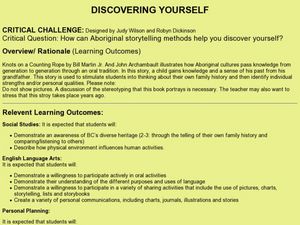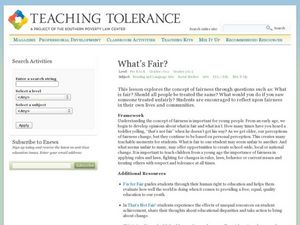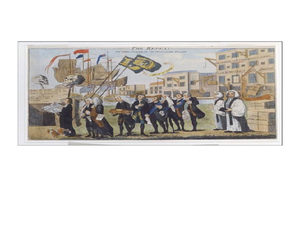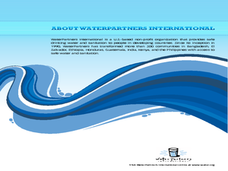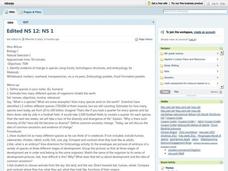Curated OER
Novel Ideas: History of the American Novel
Explore the history of the American novel in the contexts of literature and US history. How does a novel or piece of writing from a particular time showcase the mood during that historical period? After conducting research and discussing...
Curated OER
Learning about the Holocaust
Students participate in learning about the Holocaust including the Japanese Internment Camps. They view the movie, "Schindler's List," in order to gain an even better understanding of the Holocaust. They develop a Power Point...
Curated OER
Protecting Philippine Reefs
Students watch a slide show about the Philippine Reefs to explore the topic of fish populations. In this reef and fish population lesson, students watch a slide show about fish populations and how the Peace Corps works...
Curated OER
Discovering Yourself
Students explore Aboriginal storytelling. In this literature lesson, students read Knots on a Counting Rope and then create a story line as they discuss the attributes of Aboriginal culture. Students retell the story in their own words.
Curated OER
Painting Modern Life
Examine three Cubism art pieces by Pablo Picasso and Georges Braque with your students. They will research how Cubism was advanced due to Picasso and Braque. and then compare and contrast Cubist works through image based discussion. Your...
Curated OER
Health Enhancement
Seventh graders play physical movement games to enhance their health and research Indian cultures. In this movement lesson plan, 7th graders research Indian movements and use them in physical activity.
Curated OER
Reading the River
In collaborative groups, young ecologists measure the temperature, pH, and dissolved oxygen for three different freshwater samples. They examine each sample with a microscope and record observations on the microorganisms in the pond...
Curated OER
Diction: Formal and Informal Language
Coke or Pepsi? Is it the taste or the advertising that determines preference? As part of a study of diction, class members examine two passages, one formal and one informal, about Coca-Cola and Pepsi. In addition, they consider word...
Curated OER
Night: Socratic Questioning Activity
We construct meaning through discussion, so help your readers of Elie Wiesel's work Night with a socratic questioning activity. The strategy is outlined on the first page, and the second page offers some example questions you give to...
Curated OER
The Kite Runner: The Pomegranate
To better understand the conflict between Amir and Hassan, two characters in Khaled Hosseini's The Kite Runner, readers assume the voice of one of the boys and craft a letter to the other that explains his feelings and concerns.
Teach Engineering
Complex Networks and Graphs
Show your class how engineers use graphs to understand large and complex systems. The resource provides the beginnings of graph theory by introducing the class to set theory, graphs, and degree distributions of a graph.
Curated OER
Masks of Africa
Students explain the purpose of masks to various cultures in Africa. They recognize the conceptual patterns used to create African masks and illustrate their understanding by creating their own masks
Curated OER
Adinkra Cloth
Young scholars locate Ghana on a map of Africa and discover features of Ghana culture. They synthesize the importance of Adinkra symbols and cloth to the people of West Africa and design an Adinkra cloth.
Curated OER
Eating Under the Rainbow
Students investigate the lure of snack-food advertisements to explain how snacks can fit into a healthy diet.
Curated OER
How Much Does Smoking Really Cost?
Fifth graders discuss their future plans with the counselor and then complete the True/False survey. They read through the tobacco fact sheet and answer questions asked by the counselor. As a group, they calculate the cost per cigarette...
Curated OER
Finding and Authenticating Online Information on Global Development Issues
Students discover how to find authoritative resources. In this research skills instructional activity, students examine strategies for using the Internet effectively to research global development issues.
Curated OER
What's Fair?
Students investigate the concept of fairness. In this fairness lesson, students discuss fairness and how different people view it in different ways. They read stories which deal with fair and unfair.
Curated OER
Lesson 5: Technology: Conveniences and Consequences
Students identify positive and negative impacts of technology. In this technological advancements lesson, students consider how toxic pollution affects the Earth and its inhabitants. Students participate in 3 activities that allow them...
Curated OER
The Art of Political Cartoons in Revolutionary America
Students analyze political cartoons. In this colonial America lesson, students examine the provided political cartoons and respond to analytical questions about each of them.
Curated OER
Walking For Water
Students investigate how third world countries get their water. In this water lesson, students research how countries like Kenya and Ethiopia get their water supply. Students participate in an experiment to role play how difficult it is...
Curated OER
Mother Language Day
For this Mother Language Day worksheet, students complete activities such as reading a passage, matching phrases, fill in the blanks, choose the correct word, multiple choice, unscramble the words, sequencing, unscramble the sentences,...
Curated OER
Displaying Populations: Jellybeans, Paper and People
Learners investigate the factors affecting population growth. For this biology lesson, students collect data from the lab and graph them. They estimate population size using a mathematical formula.
Curated OER
Role Playing in North America: Mid 1600s-Mid 1700s
Eighth graders apply their knowledge of North American history from the mid 1600's through the mid 1700's to a role-playing scenario. In small groups they plan, write, and perform a dramatic skit of a group that was affected by events in...
Curated OER
Natural Selection
Students estimate how many different species of organisms inhabit the Earth. In groups, they match the pictures of embryos at the different stages of development. They compare and contrast animals from the sky, land, and water and...



